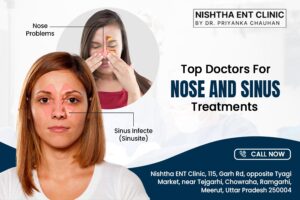ENT Clinic for Throat Infection is dedicated to providing specialized care for throat infections. With a focus on effective treatment and patient comfort, the clinic has established itself as a trusted destination for those seeking relief from throat-related issues.Throat infections can be painful and debilitating, making it essential to seek professional help. At Dr. Priyanka Chauhan’s clinic, patients receive personalized attention and expert care from a seasoned specialist.
Key Takeaways
- Expert care for throat infections
- Personalized treatment plans
- State-of-the-art facilities
- Compassionate and experienced staff
- Effective treatment options
- Comprehensive care for related issues
Understanding Common Throat Infections
Throat infections, though common, can lead to significant discomfort and complications if not properly managed. The throat, being a crucial part of the respiratory and digestive systems, is susceptible to various infections. Understanding these infections is key to seeking the right care from a sore throat specialist.
Anatomy of the Throat and Infection Pathways
The throat, or pharynx, is a muscular tube that extends from the back of the nose to the esophagus. Its anatomy makes it a pathway for both air and food, making it prone to infections. The throat’s lymphoid tissues, such as the tonsils, play a role in immune defense but can also be sites where infections occur.
Bacterial vs. Viral Throat Infections
Throat infections can be caused by either bacteria or viruses. Bacterial infections, such as those caused by Streptococcus pyogenes, require throat infection diagnosis to determine the appropriate antibiotic treatment. Viral infections, on the other hand, are managed differently, often focusing on symptom relief.
Risk Factors for Developing Throat Infections in Indian Climate
The Indian climate, with its varying temperatures and humidity levels throughout the year, can contribute to the risk of developing throat infections. Factors such as air pollution, seasonal changes, and poor hygiene practices can increase susceptibility. Understanding these risk factors is crucial for prevention and timely treatment.
Types of Throat Infections and Their Symptoms
Throat infections are a common health issue that can manifest in various forms, each with distinct symptoms and complications. These infections can significantly impact an individual’s quality of life, making it essential to understand their types, symptoms, and appropriate treatments.
Tonsillitis: Signs, Symptoms and Complications
Tonsillitis is characterized by the inflammation of the tonsils, often resulting from bacterial or viral infections. Symptoms include sore throat, fever, swollen tonsils, and difficulty swallowing. Effective tonsillitis remedies involve a combination of rest, hydration, and, in some cases, antibiotic therapy.
Pharyngitis: Causes and Clinical Presentations
Pharyngitis refers to the inflammation of the pharynx and can be caused by viral or bacterial infections. Common symptoms include a sore throat, redness, and swelling. Pharyngitis care involves symptomatic relief through pain management, hydration, and, if necessary, antiviral or antibiotic medications.
Laryngitis: Voice Changes and Warning Signs
Laryngitis is the inflammation of the larynx, often leading to voice changes, hoarseness, or loss of voice. It can be caused by vocal strain, infections, or irritants. Resting the voice and avoiding irritants are crucial steps in managing laryngitis.
Streptococcal Infections and Their Complications
Streptococcal infections, caused by Streptococcus bacteria, can lead to severe throat infections, including strep throat. If left untreated, these infections can result in complications such as kidney inflammation or rheumatic fever. Prompt diagnosis and antibiotic treatment are essential in managing streptococcal infections.
Understanding the different types of throat infections and their symptoms is crucial for seeking appropriate medical care. By recognizing the signs and symptoms early, individuals can receive timely treatment, reducing the risk of complications and promoting a faster recovery.
When to Visit an ENT CLINIC FOR THROAT INFECTION
Recognizing the signs that indicate a need for professional medical attention for throat infections is vital. Throat infections, while common, can sometimes signal a more serious condition or lead to complications if not properly treated.
Persistent Symptoms That Require Specialist Attention
Certain symptoms warrant a visit to an ENT clinic. These include severe throat pain, difficulty swallowing, high fever, and swollen lymph nodes. If symptoms persist or worsen over time, it’s crucial to seek medical attention.
“Early intervention can prevent complications and reduce the risk of long-term damage,” says Dr. [Last Name], an experienced otolaryngologist.
Complications of Untreated Throat Infections
Untreated throat infections can lead to complications such as abscesses, kidney inflammation, or even rheumatic fever in the case of streptococcal infections. It’s essential to be aware of these potential risks.
Special Considerations for Children and Elderly Patients
Throat infections in children and elderly patients require special attention due to their vulnerable immune systems.
Pediatric Throat Infections: What Parents Should Know
Children are more prone to throat infections due to their developing immune systems. Parents should watch for signs of distress, such as refusal to eat or drink, and seek medical help if symptoms persist.
Geriatric Concerns with Throat Infections
Elderly individuals may experience more severe symptoms or have underlying conditions that complicate throat infections. Regular monitoring and timely medical intervention are critical.
| Patient Group | Special Considerations |
|---|---|
| Children | Monitor for signs of distress, refusal to eat/drink |
| Elderly | Watch for severe symptoms, underlying conditions |
Visiting an ENT doctor near you can provide peace of mind and ensure that you receive the appropriate care for throat infections.
Diagnostic Procedures Performed by a Sore Throat Specialist
Diagnosing throat infections involves a combination of physical examination, laboratory tests, and sometimes advanced imaging techniques. A sore throat specialist will typically begin with a thorough examination to assess the patient’s condition.
Physical Examination Techniques
A physical examination is crucial in diagnosing throat infections. The specialist will examine the throat, looking for signs of inflammation, swelling, or other abnormalities. This may involve using a tongue depressor to visualize the tonsils and the back of the throat.
The examination may also include checking for swollen lymph nodes in the neck, as these can be indicative of an underlying infection. By combining these observations, the specialist can begin to determine the cause of the throat infection.
Laboratory Tests for Throat Infection Diagnosis
Laboratory tests play a vital role in confirming the diagnosis of a throat infection. A throat swab is commonly used to collect a sample, which is then sent for culture or rapid antigen testing to identify the causative organism.
Blood tests may also be ordered to check for signs of infection or inflammation. These tests help the specialist to differentiate between bacterial and viral infections, guiding the selection of appropriate treatment.
Advanced Imaging and Endoscopic Procedures
In some cases, advanced imaging or endoscopic procedures may be necessary to further evaluate the throat and surrounding structures. Techniques such as CT scans or MRI scans can provide detailed images of the throat and help identify complications.
Endoscopy allows the specialist to directly visualize the inside of the throat and larynx, helping to diagnose conditions such as laryngitis or abscesses. These procedures are particularly useful when symptoms persist or when there are concerns about potential complications.
Differential Diagnosis Considerations
When diagnosing throat infections, it’s essential to consider other potential causes of symptoms. The specialist must differentiate between various conditions that can cause similar symptoms, such as allergies, acid reflux, or other non-infectious causes.
A thorough diagnostic evaluation helps to ensure that the underlying cause is identified and treated appropriately. By combining clinical findings with laboratory and imaging results, the specialist can develop an effective treatment plan tailored to the patient’s needs.
Comprehensive Treatment Approaches by an Otolaryngologist
When it comes to treating throat infections, an otolaryngologist employs a range of comprehensive treatment approaches. Throat infections, whether bacterial or viral, require a thorough understanding of the underlying cause to determine the most effective treatment plan.
Medication-Based Treatments: Antibiotics and Antivirals
The primary treatment for bacterial throat infections involves the use of antibiotics. Antibiotics such as penicillin or amoxicillin are commonly prescribed to combat bacterial infections. For viral infections, antiviral medications may be recommended, although their effectiveness can vary depending on the virus causing the infection.
- Antibiotics: Effective against bacterial infections, reducing the risk of complications.
- Antivirals: May be used for specific viral infections, though their efficacy can be limited.
Surgical Interventions for Recurrent Infections
In cases of recurrent throat infections, surgical intervention may be necessary. Tonsillectomy, the surgical removal of the tonsils, is a common procedure for patients suffering from recurrent tonsillitis.
Pain Management Strategies
Effective pain management is crucial in the treatment of throat infections. This can include over-the-counter pain relievers, throat lozenges, and warm saline gargles to soothe the throat.
Hydration and Nutritional Support During Recovery
Adequate hydration and nutritional support are vital during the recovery phase. Patients are advised to consume plenty of fluids and maintain a balanced diet rich in vitamins and minerals to support the immune system.
Ayurvedic and Traditional Indian Approaches
In addition to conventional treatments, Ayurvedic and traditional Indian approaches can offer supplementary benefits. Herbal remedies and specific dietary recommendations based on Ayurvedic principles can help in managing symptoms and supporting recovery.
By adopting a comprehensive treatment plan that may include conventional medication, surgical options, and traditional approaches, patients can effectively manage throat infections and prevent future occurrences.
Effective Tonsillitis Remedies and Pharyngitis Care
Throat infections like tonsillitis and pharyngitis can significantly impact one’s quality of life, making it crucial to explore effective remedies and care strategies. These conditions, though often presenting with similar symptoms, require distinct approaches to treatment and management.
Medical Treatments for Acute and Chronic Tonsillitis
Tonsillitis, characterized by the inflammation of the tonsils, can be acute or chronic. Medical treatments often involve the use of antibiotics for bacterial tonsillitis, while viral tonsillitis may require antiviral medications. In cases of recurrent or severe tonsillitis, tonsillectomy may be considered.
When to Consider Tonsillectomy
Tonsillectomy, the surgical removal of the tonsils, is typically recommended for patients with recurrent episodes of tonsillitis or those experiencing significant complications. This decision is usually made after other treatments have failed to provide relief.
Managing Pharyngitis: From Diagnosis to Recovery
Pharyngitis, or inflammation of the pharynx, requires a comprehensive approach to management. This includes symptomatic relief through pain management, hydration, and rest. Antibiotics may be prescribed if the cause is bacterial.
Specialized Care for Recurring Pharyngeal Infections
For individuals experiencing recurring pharyngeal infections, specialized care is essential. This may involve identifying underlying causes, such as allergies or environmental factors, and developing a personalized treatment plan to prevent future episodes.
Effective management of tonsillitis and pharyngitis not only alleviates current symptoms but also plays a crucial role in preventing future occurrences. By understanding the available treatment options and adopting a proactive approach to throat health, individuals can significantly improve their quality of life.
Laryngitis Treatment and Voice Rehabilitation
Laryngitis, an inflammation of the larynx, can significantly impact an individual’s quality of life, particularly for those who rely on their voice professionally. Effective management of laryngitis involves understanding its causes, symptoms, and the appropriate treatment modalities.
Acute vs. Chronic Laryngitis: Different Approaches
The approach to treating laryngitis varies significantly depending on whether the condition is acute or chronic. Acute laryngitis often results from viral infections and may resolve on its own with rest and hydration. In contrast, chronic laryngitis requires a more comprehensive treatment plan, addressing underlying causes such as acid reflux, allergies, or vocal strain.
Here is a comparison of the treatment approaches for acute and chronic laryngitis:
| Treatment Aspect | Acute Laryngitis | Chronic Laryngitis |
|---|---|---|
| Primary Treatment | Rest, hydration, and voice conservation | Addressing underlying causes, lifestyle modifications |
| Medication | Antiviral or antibacterial medication if necessary | Proton pump inhibitors for acid reflux, corticosteroids for inflammation |
| Voice Therapy | Optional, depending on severity | Often recommended to improve vocal technique and reduce strain |
Voice Therapy Techniques
Voice therapy is a crucial component of laryngitis treatment, especially for individuals with vocal strain or those who use their voice professionally. Techniques may include:
- Breathing exercises to support vocal production
- Vocal exercises to improve pitch, tone, and volume control
- Relaxation techniques to reduce vocal strain
Professional Voice Users: Special Considerations
For professional voice users, such as singers, actors, or public speakers, laryngitis treatment must be tailored to their specific needs. This may involve working with a vocal coach or speech-language pathologist to develop a personalized voice rehabilitation plan.
Recovery Timeline and Expectations
The recovery timeline for laryngitis varies depending on the severity of the condition and the effectiveness of the treatment plan. Generally, individuals with acute laryngitis can expect to recover within a few weeks, while those with chronic laryngitis may require ongoing management.
By understanding the different approaches to laryngitis treatment and incorporating voice therapy techniques, individuals can achieve optimal vocal health and reduce the risk of future episodes.
Preventing Recurrent Throat Infections in Indian Conditions
Preventing recurrent throat infections requires a multi-faceted approach, especially in India’s diverse climatic conditions. Adopting a combination of lifestyle modifications, staying updated with recommended vaccinations, and strengthening immunity through diet and exercise can significantly reduce the incidence of throat infections.
Lifestyle Modifications for Throat Health
Making certain lifestyle changes can help prevent throat infections. This includes avoiding exposure to irritants such as smoke and pollution, maintaining good hygiene practices like regular handwashing, and staying hydrated to keep the throat moist.
Vaccination Options Available in India
Staying up-to-date with vaccinations is crucial. Vaccines such as the flu vaccine and pneumococcal vaccine can help prevent infections that may lead to throat complications. Consulting with an ENT specialist can provide guidance on the most appropriate vaccinations.
Strengthening Immunity Through Diet and Exercise
A robust immune system is key to fighting off infections. A diet rich in fruits, vegetables, and whole grains, along with regular exercise, can enhance immunity. Foods high in antioxidants, such as berries and leafy greens, are particularly beneficial.
Managing Environmental Factors and Seasonal Allergens
Environmental factors, including seasonal changes, can significantly impact throat health. During the monsoon season, precautions such as avoiding contaminated water and managing allergies can help prevent infections.
Monsoon Season Precautions
During the monsoon, it’s essential to avoid drinking untreated water and to maintain a clean environment to prevent the spread of infections.
Air Pollution Considerations in Urban Areas
In urban areas, air pollution is a significant concern. Using air purifiers and wearing masks when outdoors can help reduce exposure to pollutants that irritate the throat.
| Precautionary Measure | Benefit |
|---|---|
| Avoiding smoke and pollution | Reduces throat irritation |
| Staying hydrated | Keeps the throat moist and healthy |
| Vaccinations | Prevents infections that can lead to throat complications |
Finding the Right ENT Doctor Near Me in India
The quest for the perfect ENT doctor near you in India can be simplified by understanding what qualifications and services to look for. With a plethora of options available, it’s essential to navigate the selection process carefully to ensure you receive the best care for your throat infections.
Qualifications to Look For in an ENT Specialist
When searching for an ENT specialist, it’s crucial to check their qualifications. Look for a doctor who is certified by a reputable medical board in India, such as the Medical Council of India or a state medical council. Ensure they have the necessary training in otolaryngology, which includes both theoretical knowledge and practical experience.
Questions to Ask During Your First Consultation
During your initial consultation, ask pertinent questions to gauge the ENT specialist’s expertise and approach to treatment. Inquire about their experience with cases similar to yours, the diagnostic procedures they use, and the treatment options they recommend. Pay attention to how well they communicate and whether they address your concerns satisfactorily.
Understanding Treatment Costs and Insurance Coverage
It’s vital to understand the costs associated with your treatment and whether your insurance covers ENT services. Clarify the costs of consultations, diagnostic tests, and treatments with your ENT doctor. Check if your insurance provider covers these expenses and if there are any out-of-pocket costs you need to be aware of.
The Importance of Follow-Up Care
Follow-up care is a critical aspect of managing throat infections effectively. Your ENT doctor should provide a clear plan for follow-up consultations to monitor your recovery and adjust treatment as necessary. Adhering to this plan can significantly impact your recovery.
Telemedicine Options for Remote Consultations
In today’s digital age, many ENT specialists offer telemedicine services, allowing for remote consultations. This can be particularly beneficial for those with mobility issues or living in remote areas. Discuss telemedicine options with your ENT doctor to see if it’s a viable choice for your follow-up care.
Conclusion:
Throat infections can significantly impact daily life, causing discomfort and potentially leading to serious complications if left untreated. Visiting an ENT clinic for throat infection care is crucial for effective diagnosis and treatment. Specialized ENT care ensures that patients receive comprehensive treatment tailored to their specific condition, whether it’s tonsillitis, pharyngitis, or laryngitis.
By understanding the causes, symptoms, and treatment options available, individuals can take proactive steps towards maintaining throat health. An ENT specialist can provide personalized care, from medication-based treatments to surgical interventions, and offer guidance on preventing recurrent infections.
For those experiencing persistent throat infection symptoms, seeking care at an ENT clinic is a vital step towards recovery. With the right treatment and preventive measures, individuals can alleviate symptoms, prevent future occurrences, and maintain overall well-being.
FAQ
What are the common symptoms of throat infections?
Common symptoms include sore throat, difficulty swallowing, fever, swollen lymph nodes, and changes in voice. At Dr. Priyanka Chauhan’s ENT clinic, our specialists diagnose and treat these conditions effectively.
How are bacterial and viral throat infections differentiated?
Bacterial throat infections are typically caused by streptococcus and require antibiotic treatment, whereas viral infections are caused by viruses and may resolve on their own. A thorough examination by an ENT specialist, such as those at Dr. Priyanka Chauhan’s clinic, is necessary to determine the cause.
What diagnostic procedures are used to identify throat infections?
Diagnostic procedures include physical examination, laboratory tests such as throat cultures, and advanced imaging techniques like endoscopy. Our ENT clinic is equipped with the latest technology to provide accurate diagnoses.
What are the treatment options for tonsillitis and pharyngitis?
Treatment options range from medication-based approaches, including antibiotics and antivirals, to surgical interventions like tonsillectomy for recurrent cases. Our specialists at Dr. Priyanka Chauhan’s ENT clinic tailor treatment plans to individual needs.
How can I prevent recurrent throat infections?
Preventive measures include lifestyle modifications, vaccination options, and strengthening immunity through diet and exercise. Our ENT specialists can provide personalized advice on managing environmental factors and seasonal allergens.
What should I look for when choosing an ENT specialist?
When selecting an ENT specialist, consider their qualifications, experience, and the range of services offered. At Dr. Priyanka Chauhan’s clinic, our specialists are dedicated to providing comprehensive care for throat infections.








